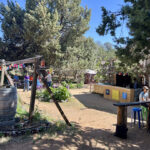Dear Reader,
One unassuming afternoon in the before times, a traveler asked infamous LA food writer Jonathan Gold for recommendations on where to eat in New Mexico. His answer was basically “ . . . ”
As in, isn’t that place mostly empty space? Is it actually a state?
Maybe he had nothing on the Land of Enchantment because he was stuck in traffic on the 405 en route to his favorite ramen shop, or he got fed up and turned back west because he’d been driving for three hours and still hadn’t even made it to Pomona. But according to hundreds of undocumented studies that our small, savvy (if informally trained) team of researchers has conducted in locations around the country, Gold’s food map is not the only one with a blank spot between Arizona and Texas.
So what? This: being unknown can be a good thing. But as everyone who’s experienced implicit (not to mention explicit) bias knows, there’s such a thing as a negative feedback loop. And even the most curious among us can get stuck on the treadmill of scarcity thinking.
Based on other informal studies, it’s been concluded that 2021 is the year to get unstuck. This might mean many things. Maybe it’s quitting cigarettes or corporate beef. Maybe it’s weaning our state off of coal and gross receipts taxes. Maybe it’s getting back into real pants. Maybe, instead of ordering the same old pho #1 or #3, it’s trying the pho ga or the banh xeo or the bun bo hue.
For us here at edible New Mexico, it’s all about breaking open our perspectives and making an adventure of eating food and drinking drinks in the great wide state of New Mexico.
Enter The Bite. Hitting stands September 1, edible’s sister magazine / alter ego will provide smart, artful, bite-size stories that foster a deeper understanding of our region’s diverse culinary cultures; inspire adventurous, informed, community-minded forays into local food; and help build a stronger, more resilient, and more inclusive food community.
Till then, we’ll be sharing news, words, and delicious things via newsletter. You can unsubscribe at any time by clicking the unsubscribe link in the footer at the bottom of this email.
—Your friends at edible New Mexico & The Bite

Delicious Things
If you stumble upon huitlacoche for sale at a vegetable market during your travels through Mexico, you might be forgiven for mistaking the blackened, moldy cobs for a binful of corn compost. Why, you might logically ask yourself, is this obviously capable vendor displaying ugly, fungus-covered ears of corn alongside her beautiful tomatillos, serranos, and chayotes? The answer is this: corn smut, as huitlacoche is sometimes translated, is delicious.
In texture, the specialized fungus—it grows only on corn—can be inky and smooth or reminiscent of the ash used in some Indigenous Mexican and New Mexican cooking. In flavor, it is pure umami. In the antojito we recently had at Sazón, the portions were small and the texture smooth, transmuted in a dish designed as an initiation, each bite a perfect profile of this earthy, savory treat.
Entrances & Exits
Distillations
Miniature bottles of booze no longer populate the walls behind the cash register at New Mexico wine and liquor stores. But miniature bottles of fish sauce can still be purchased at local markets such as Talin. Which, if you use fish sauce in less-than-Thai proportions, might not be a bad idea—according to Pailin Chongchitnant, Thai food cookbook author and vlogger and a guest on episode 479 of Spilled Milk, “Your ancient fish sauce is not going to make you sick . . . but it’s not going to taste good anymore.”
Valerie Stivers reconstructs meals from literature. In “Cooking with D.H. Lawrence,” she builds an outdoor oven and attempts to replicate the apology cake Lawrence reputedly baked for friends after a blowout fight at the ranch outside Taos where he and his wife lived. “Despite the gamekeeper’s preference for beer,” Stivers writes, referring to the lover in Lawrence’s most well-known novel, “wine seemed a better fit for my outdoor summer menu. To my surprise, I learned that New Mexico was the first place wine was grown in what is now the U.S., starting in 1548, when it was introduced by Spanish missionaries who planted a grape now known as Mission in this country and Pais in Chile.”
As has been widely reported, the entire restaurant industry continues to be short-staffed—despite a recent flurry of hiring. In the event that this results in slower service, tiny imperfections, or other minor annoyances when you’re dining out—take a breath. And, maybe, pick up a book or two from this reading list and spend some time behind the scenes.








